27th November 2019, similarities between Croatians and Māori as told by a Māori living in Dalmatia, married to a Croatian.
27th November 2019 marks 127 years since the first recorded marriage between a Croatian and Māori in 1892 Croatian-born Andrija Kleskovic married Erina Kaaka at St. Saviour’s Church in Kaitaia. 127 years later and I find myself married to a Croatian living in Dalmatia (maybe the only Māori married to a Croatian without roots here?), so it seemed fitting to write about the similarities between the two cultures from my perspective and experience.
When I first arrived in Split, I felt home. It sounds dramatic and I can’t quite explain it but the second I stepped off the bus and looked out over Split, my soul smiled and something felt familiar… Considering I had never been here before and knew nothing about Croatia, that was a strange feeling, to say the least.
I came to Croatia to work on a boat as a tour guide, ended up falling in love with a Croatian captain and the rest, they say, is history. Five years married and I find myself living and loving my life here in Dalmatia.
“What are you doing living in Croatia, don’t you miss home?”
Deeply. I miss my friends and whanau (family) immensely but after five years living here, my mind has come to understand what my soul first recognised – something about this place feels like home. There are many similarities between the Māori and Croatian/Dalmatian culture, so it is no wonder that when Croatians began to arrive on the shores of Aotearoa (New Zealand), they were embraced by Māori. Croatians in New Zealand were even given a name in the Māori language – “Tarara” – this name came from when Croatians first arrived speaking very fast in their native tongue, to the Māori it sounded like they were just saying “tarararararara”. This makes me laugh because Croatians and particularly Dalmatians are known to speak incredibly fast and chew their words, so this name seems perfect.
When I first met my husband’s grandmother, she couldn’t comprehend how it was that I came to be with her grandson because “you come from the end of the world” and while this is true, little did we know how similar our cultures are.
So, what are the similarities between the Dalmatian and Māori culture?
1. Whānau – Family
In Māori, the word “whānau” is translated as family but its meaning runs much deeper than that, it can include the physical, emotional and spiritual world and “… it is through the whanau that values, histories, and traditions from the ancestors are adapted for the contemporary world.” (Definition of whanau). Family is extremely important to Māori, it tells a story of who we are, where we come from and where we are going.
In Croatia, family is of utmost importance, and just like Māori, the meaning of the word family extends beyond the nuclear family to include Grandparents, Aunts, Uncles, cousins… One of the first questions you will be asked here, is – “what is your family name?” People like to know this because then they can ‘place’ you, by knowing the family, they know where you come from.
The strength of the family unit was something that first stood out to me and something I admire. While whānau is important in Māori culture, as New Zealand becomes more modernised and westernised, I feel like the family unit is not what it once was. In Croatia, it is not uncommon for families to live together in the same house or apartments above each other, and while this can have its pros and cons (privacy is a foreign word), in general, I see it as a beautiful thing.
I also love that the grandparents are so involved in their grandchildren’s lives and upbringing. In the traditional Māori community, it was not uncommon for grandchildren to be raised by their grandparents – a way of passing on family traditions and history, and just like here, there was a village approach to raising children. One other fact which made me laugh and feel at home is that in Croatia, just like with Māori, most older women are referred to as Aunt “Teta” (whaea in Māori), further proof of family as a notion that encompasses community, which I adore.
2. Respect for Elders/Kaumātua
The intense love, adoration and connection that Croatians have to their grandparents just make my heart melt. The first time I saw my husband with his grandparents, I knew that he was a man I could marry. Yes, this ties into family but it’s more than this. My husband’s grandmother ‘baba’ was widely respected in her village and many people would stop in just to get her advice, they valued her wisdom and it went beyond the practical, into the spiritual (not just in a church sense either).
In Māori culture, she would be called a Kuia – a wise, female elder, someone we turn to for knowledge and wisdom, especially about the deeper matters of life. The word for elders in Māori is Kaumātua – who are respected not just for their age but their knowledge on familial history, tribal history and traditions.
Croatians have an ingrained respect for their elders, as do Māori. Respect is built into the Croatian language, with one of the declensions being a more polite form of speaking to people, in particular – elders. But it’s more than simple niceties, like giving up your seat on the bus for an elder, it feels genuine. In Croatia, I say “dobar dan” (good day) to every elder I see and young children walking down the street do the same to me. I’ve watched my husband carry groceries for elder neighbours, or pick them up and drive them where they need to go if they are walking – including strangers on the street! Both cultures have this respect and connection to the whole rather than separation of the individual.
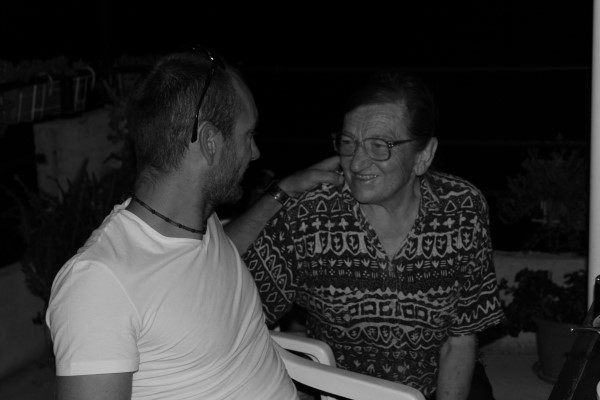
My husband with his late Baba.
3. Tight-knit Communities
I grew up in a small town where the community was strong; it’s one of those things that you don’t understand or appreciate until you leave. Not until I came to Croatia, was I able to reflect through the eyes of an adult and realise how important a strong community is. When we went through difficulties in our family growing up, our community was there to support, feed, love and help take care of us, we truly were raised by a village! I can see this same support here.
While everyone knowing your business might not be everyone’s cup of tea (the negative side of tight communities); to feel safe and part of something larger than yourself is a strong foundation for healthy development. Both cultures have this.
4. A strong sense of Cultural Identity
I strongly identify with being Māori just as much as being from New Zealand. I am proud of my culture and where I am come from, just as all Croatians I have met are proud to be Croatian, and Dalmatians take further pride in being from the Dalmatian coast or islands. Our traditions, culture, music, food, history, family, tribe/community – these are all aspects that create an overall cultural identity and that both Māori and Croatians are very proud of.
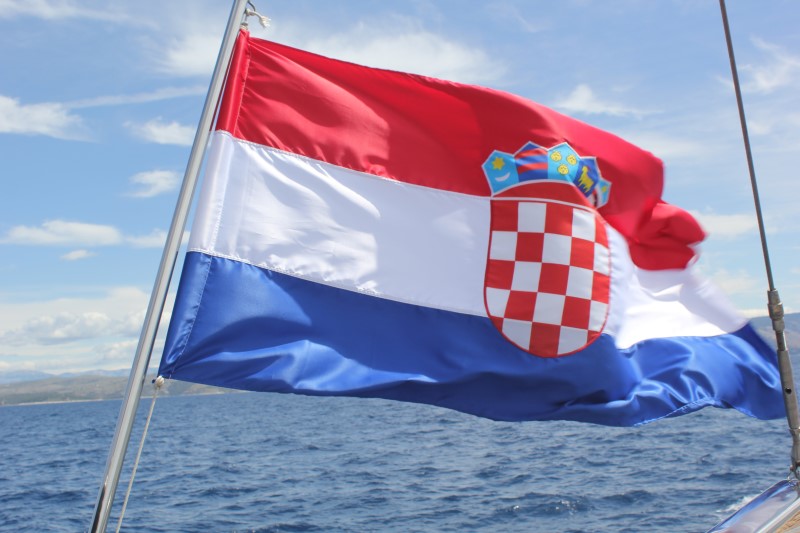
5. Faith
Almost 90% of the Croatian population is Catholic (according to the 2011 census), and while I don’t necessarily want to talk about religion, it is impossible not to mention that the Croatian culture is founded very heavily on religion.
Before colonisation, Māori held their own set of beliefs which included the natural and living world, and an overall message of connectedness. From the 19th Century onwards, many Māori converted to Christianity, including the Roman Catholic Church. Without entering into a theological debate, I think I can safely say that faith is a large part of both cultures, whether in a religious sense or the more spiritual approach of belief in something larger than one’s self.
6. Music
In the Māori culture, music is a huge part of our cultural identity, upbringing and sense of belonging. Music was a way that our history, traditions and beliefs were passed on and many of our songs (waiata) are about nature and particularly the sea – which is where our similarities with Dalmatians grow stronger.
Māori have groups called “kapa haka” which perform traditional songs, dance and haka (I’m sure everyone has seen the All Blacks perform the haka). A few years ago, a Māori kapa haka group was touring Croatia with the Kralj Tomislav Ensemble and I was fortunate enough to see them in Korčula and burst into tears – my two worlds collided!
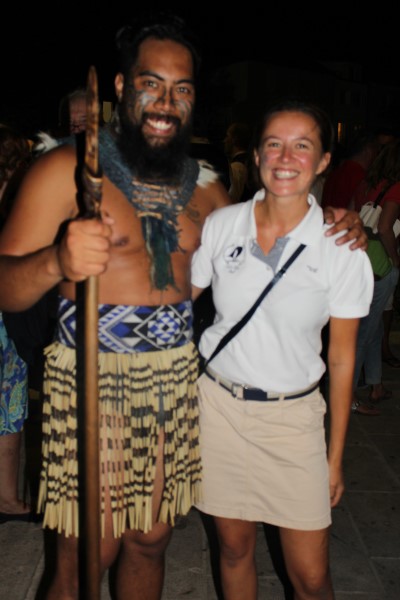
All smiles meeting with the Kapa Haka group in Korcula
Croatia also has groups called “Klapa”, an ensemble (typically male) which performs traditional songs in acapella. While they may be different in style, they are both beautiful and powerful in their own way. The first time I saw Klapa, it resonated with my Māori side and it seems I am not the only one – it also resonated with a Samoan group from New Zealand, so much so that they started their own Klapa group called ‘Klapa Samoana’ and even toured Croatia – talk about uniting cultures.
For both cultures, if there is a celebration or gathering, you can guarantee there will be singing! When I first arrived this simultaneously made me feel at home and disconnected – being surrounded by music but not being able to join in made me realise how important music is to my culture and sense of belonging. I’ve finally learned a few songs which helps me feel less homesick but maybe I should take a leaf from Klapa Samoana’s page and start the first kapa haka group in Dalmatia?…
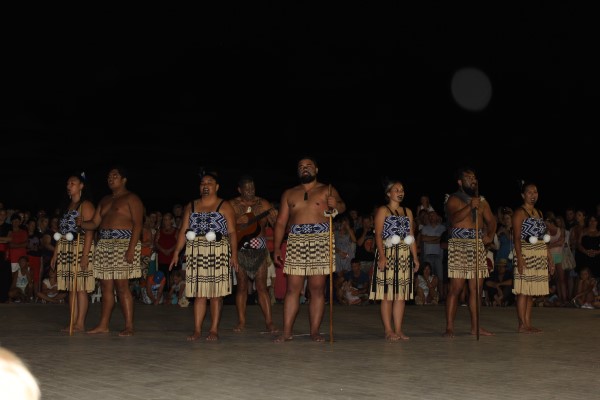
7. Connected to Nature
Māori have always held a system of beliefs based around our connectedness to nature. The term “Kaitiakitanga” defines our relationship to nature as one of guardianship and management; that we are the caretakers of nature. Going back years, Māori lived in a natural rhythm and relationship with nature, respecting the natural resources available.
Talk to older Croatians and this was also their natural practice – they lived from and respected the land, nothing was wasted, everything had a purpose. My husband’s grandparents lived in the same village all of their life, they grew all of their food and lived a ‘sustainable life’; though it wasn’t because sustainability was on-trend, this was the standard practice. As the world becomes more westernised and dominated by consumerism, we are all drifting away from these principles and could do with returning to them.
Naturally, living by the sea, the weather plays a central role in life on the coast – and dalmatians, in particular, are known to always be grumbling about the weather one way or another, cursing ‘Jugo’ for the lethargy or thankful to ‘Bura’ for clearing the air (and mind). Both cultures have myths and superstitions related to the weather.
8. Connected to the Sea
Both Māori and Dalmatian cultures are heavily intertwined with the sea. It is said that Māori first arrived in Aotearoa after navigating in their waka (canoes) from Hawaiki (Polynesia) more than 1,000 years ago – making them exceptional seamen and explorers. While Dalmatians are born with the Adriatic in their blood; this region churns out world-class sailors, rowers, water-polo players and any other sport related to the water. Both cultures love fishing and their kaimoana – seafood. Even though I have always loved the ocean, I had nothing to do with sailing until I moved to Croatia and married my Dalmatian skipper. Now we work on a yacht together and sailing to New Zealand as part of a round-the-world adventure is on the cards in the next few years!
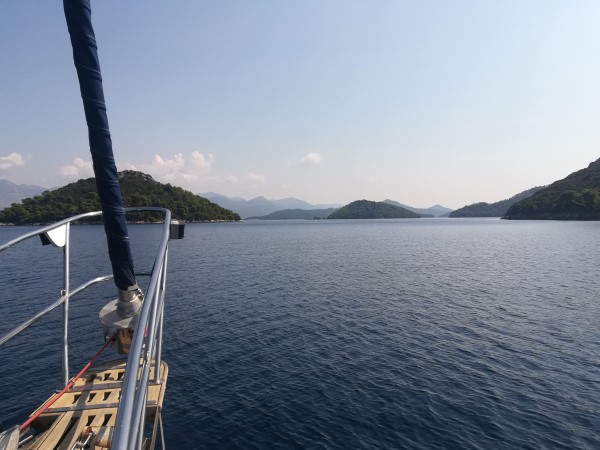
9. Food, Glorious Food
In both Māori and Croatian culture, food is almost its own religion. In the Māori culture, at the heart of every gathering or celebration is food. Not only this but the hospitality and culture around food is one of generosity – ‘whatever we have, we will share it’ and there is real pride and joy in being able to provide food for others.
This is the same in the Croatian culture, and maybe even more so since most Croatian families make their own olive oil, pršut, vino or grow vegetables and raise stock; if this is the case, they are even more proud to offer you what they have. Just like in Māori culture, I have never walked into a Croatian’s house and not been offered food and drink, in fact, always be prepared to eat!
We even have some similar dishes, which many may not be aware of. A famous dish in Croatia is called “peka”, which is typically lamb or veal in a cast iron dish, which has been buried beneath embers and allowed to slow-cook for 2 – 3 hours.
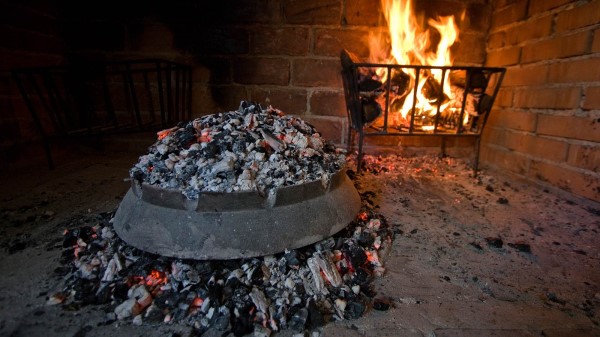
traditional peka, image credit: Croatia.hr
In Māori, we have something similar, though far more arduous – our traditional meal is called a “hāngī”. A deep hole is dug in the earth, and river stones that have been heating in a fire are placed at the bottom, then meat and vegetables are placed in cloth/hessian sacks (traditionally flax leaves) over the stones, then covered with a wet cloth and earth – which traps the heat and allows the food to cook for 3 – 4 hours.
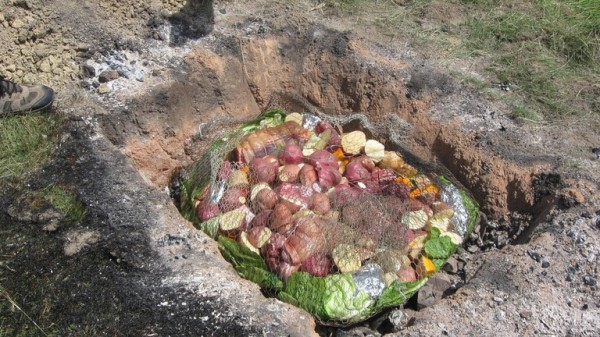
traditional Hangi, image credit CultureTrip
I love both of these dishes and while the food is excellent, it is also just as much about the process – prepping the meal, getting together, sitting around the fire with close friends and family, laughing, singing, drinking… both of these dishes hold some of my favourite memories.
In Māori, we also do something called a ‘boil-up’, which, as the name suggests is boiling meat (typically pork), potatoes and vegetables. Croatians also do this, but would call it “lešo”. Come to think about it, just a love of meat, in general, is shared by both cultures – roast/spit lamb, pork… And, as with Dalmatians, Māori also love seafood! Basically,a food is important and lies at the heart of both cultures.
10. Heart
This might be harder to explain but I find both Māori and Croatians to be “hearty people”; there is a strength in soul and in character that I find hard to put in words. When I was first tour guiding, my groups always used to ask me why Croatians were so serious or looked so angry and I would tell them all – ‘once you get past that, Croatians have some of the biggest hearts you’ll ever meet’. This sometimes gets lost in daily frustrations or stories of corruption but it’s undoubtedly there. Croatia showed its heart and spirit when half a million people gathered to welcome the Croatian National team home after the World Cup and then when beloved Dalmatian singer Oliver Dragojević passed away the coast mourned; hundreds of boats took to sea in his honour and thousands celebrated his life and music. When their hearts are in the right place, Croatians can move mountains (if only we could get this reaction to all pressing matters but that’s a topic for another day).
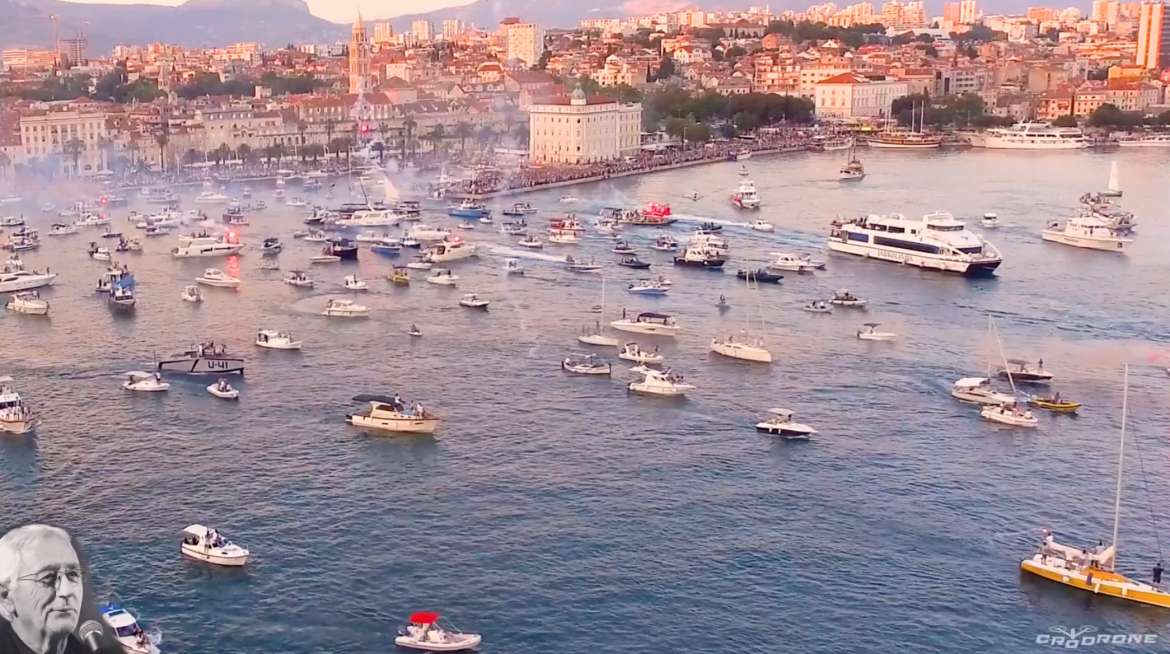
Boats honouring Oliver from Split Harbour, image: screenshot.
I miss my family, friends and roots but here it is, here I am; a Māori in Dalmatia, with no Croatian roots.
I came from the end of the world and find myself ‘home’ in Dalmatia.








